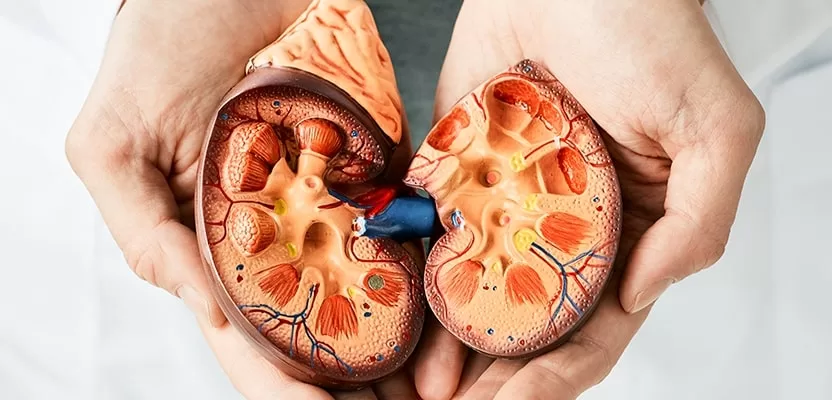+90 533 813 89 77
info@bookingforhealth.com
Kidney Cancer
Kidney cancer is a disease characterized by the uncontrolled proliferation and abnormal growth of cells in the relevant organ. The kidney filters the blood in the body, regulates mineral intake and produces urine. Kidney cancer prevents the kidney from performing these functions. Although there is no clear answer to the question of what triggers kidney cancer, many years of case studies have identified several causes.

Types of Kidney Tumors
Tumor, which are the structures formed by the uncontrolled proliferation of cells in an organ or limb, is the condition that leads to formation in the kidneys. Abnormal growth in this organ located on either side of the spine is studied in two categories: Benign kidney tumors, which are noncancerous lesions in the kidney, and malignant renal tumors, also known as kidney cancer. Of the benign renal tumors, oncocytoma and angiomyolipoma are the most common.
Kidney Cancer Causes
Kidney cancer occurs when existing cells in the kidney grow out of control and become cancerous. Initial signs of the occurrence of a malignant kidney tumor, i.e. kidney cancer, are as follows:
- Genetic predisposition,
- Age-related loss of function,
- Obesity,
- Smoking,
- Malnutrition,
- Poor lifestyle,
- Physical dysfunction,
- Environmental factors.
The age factor plays an important role in kidney cancer. In this regard, it is necessary for people aged 40-45 years to go for regular screening / health check-ups.
Kidney Cancer Symptoms
The issue of kidney cancer symptoms is a bit troublesome, because the cancer may not show symptoms until advanced stages. Therefore, it is extremely important for people over a certain age to have regular check-ups. When early-stage kidney cancer is diagnosed, it is common for it to be discovered accidentally during a screening that was done for another disease.
The symptoms of advanced kidney tumor are as follows:
- Back pain, blood in the urine,
- Feeling of a mass in the abdomen,
- Mass formation in the lateral parts of the body,
- Stomach pain,
- Weight loss and associated slimming.

Kidney Cancer Diagnosis and Examination Procedures
As mentioned above, early-stage cancers may not present with symptoms. Stage one cancers are found incidentally in the MRI and computed tomography results of patients who contact the physician for another disease complaint. Thanks to these diagnostic systems and technologies, small tumors are being detected in less time and faster than in the past. However, people who do not go to regular check-ups cannot be said to have such a chance, because kidney tumors can settle in the body for many years without treatment.
In the diagnosis of kidney cancer, CT, MRI and ultrasound examinations are performed, urine samples are taken, and the patient’s family health history is obtained. As a result of all these examinations, the condition of the cancer cells is determined and the necessary treatments are carried out. If you choose Booking for Health, you will be able to go through all these processes smoothly and comfortably.
Treatment Process for Kidney Cancer
After kidney cancer is diagnosed and examined, a treatment plan is made. The treatment may vary from person to person;
- The patient’s medical history
- Patient’s general health,
- Type of tumor,
- Stage of cancer,
- The location of the cancerous mass,
- Metastatic status of the cancer cells.
Such factors are crucial for the treatment method. What to do if the renal tumor is small: In the treatment of small kidney tumors, the abnormal structured cell mass is removed by laparoscopic method or robotic technique.
What to do if the kidney tumor is large: most or all of the kidney can be removed. A partial nephrectomy may be performed.
What to do if the kidney tumor has metastasized: Chemotherapy may be given to the patient to destroy the cancerous tissue.
The main non-surgical methods to remove the tumor are as follows:
- Ablation,
- Cryotherapy,
- Radiofrequency.
Kidney Cancer Stages
Malignant renal tumors have 4 stages. From the first stage, the density of the cancer increases. In the first stage, the tumor is no more than 6-7 cm and has not spread yet. In the second stage, it is more than 7 cm and has not yet reached the lymph. In stage III kidney cancer, the tumor has spread to organs distant from the kidney. In the fourth stage, the renal tumor has already spread significantly. Metastases can be found in organs such as the lymph nodes, bones, lungs and liver.
The premise of cancer treatment is diagnosis and subsequent cancer treatment. A good doctor specialized in cancer, a sterile and hygienic treatment environment and an appropriate space are also essential. You can contact Booking for Health to get the best conditions and high standards of treatment.